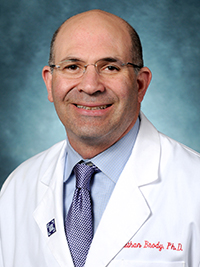
Research Professor
Surgery
Oregon Health & Science University
Portland, OR
Development of an international BRCA-PANC Consortium: a bench to bedside to bench initiative
Overview
Aim: Diagnosis
Pancreatic cancer is a devastating disease. In order to begin to make a difference in pancreatic cancer patient outcomes, we wish to leverage the success of the “best-in-class” personalized approach against this lethal cancer. This approach appears to work specifically well in patients with a specific genetic mutation (i.e., known as ‘BRCAness’ or BRCA1/2 mutations). Patients who harbor these mutations (especially prevalent in high risk individuals and Ashkenazi Jews) respond well to specific targeted anti-cancer therapies (i.e., PARP inhibitors and platinums). Unfortunately, not all patients respond, and even those patients who do initially respond, many still succumb to this disease. Herein, we are eager to establish an unprecedented consortium of institutions that will share and study these tumors in an effort to identify new ways to treating and managing these patients.
The international BRCA-PANC Consortium is a highly experienced team that has been established and is uniquely positioned to optimize outcomes for BRCA1/2-mutated pancreatic ductal adenocarcinoma (PDAC) patients. Our team members are clinicians and scientists working together and leading multiple clinical trials aimed at optimizing platinum/PARP inhibitor(PARPi)-based therapies for patients with DNA repair-deficient tumors, particularly for those with BRCA1/2-mutations. Investigators in the consortium have authored dozens of high-impact, peer-reviewed publications focused on targeted therapy for PDAC; several investigators are involved in clinical trials. Importantly, most of these clinical trials have been written with extensive tissue collection requirements, such that every enrolled patient undergoes a tumor biopsy before therapy; and when appropriate, while on therapy and upon disease progression. The biopsy collection methods are harmonized, enabling us to develop ex vivo Patient Derived Models of Cancer (PDMCs, i.e., organoids, ORG: Conditional Reprogramed Cells, CRCs; xenografts, PDXs). Therefore, the BRCA-PANC international consortium has an expanding live biobank of patient samples with corresponding PDMCs from parent tumors captured along the spectrum of responsiveness to PARPi/platinum-based therapies including tumors that are sensitive, as well as those that exhibit innate and acquired resistance to treatment.
As of the time of submission, we already have 37 validated BRCA1/2-mutated PDMCs, and we anticipate adding 50 additional PDMCs annually. We plan to add additional team members from UCLA (Drs. David Dawson and Timothy Donahue) and UPenn. We will add a clinical coordinator/administrator, and support the research infrastructure and communication with the BRCA-PANC Consortium. A meeting will be held adjacent to the American Association for Cancer Research (AACR) meeting in April 2022 to discuss scientific next steps, future funding and collaborative grant applications.
Our ultimate goal is to use this consortium to set up multiple multi-institutional clinical trials where the investigators collectively learn about these tumors and ultimately we provide state-of-the-art, improved patient care for these individuals. Our hope is by funding this consortium now, we will take a huge, realistic step in moving the needle towards making optimized personalized therapy a reality for pancreatic cancer patients.